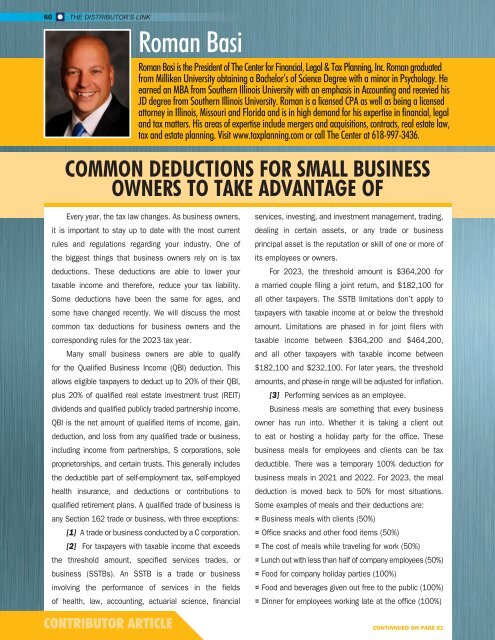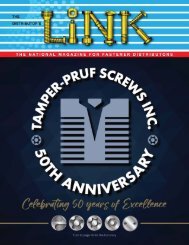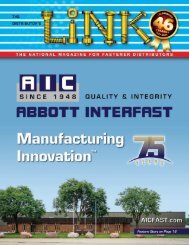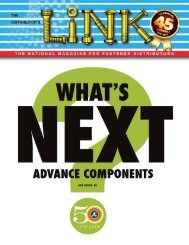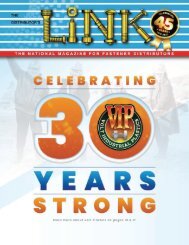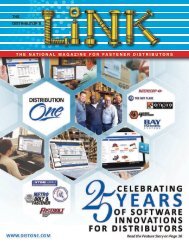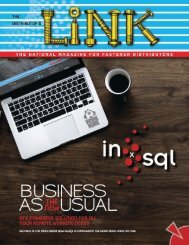SUMMER 2023
Distributor's Link Magazine Summer 2023 / Vol 46 No 3
Distributor's Link Magazine Summer 2023 / Vol 46 No 3
You also want an ePaper? Increase the reach of your titles
YUMPU automatically turns print PDFs into web optimized ePapers that Google loves.
60<br />
THE DISTRIBUTOR’S LINK<br />
Roman Basi<br />
Roman Basi is the President of The Center for Financial, Legal & Tax Planning, Inc. Roman graduated<br />
from Milliken University obtaining a Bachelor’s of Science Degree with a minor in Psychology. He<br />
earned an MBA from Southern Illinois University with an emphasis in Accounting and recevied his<br />
JD degree from Southern Illinois University. Roman is a licensed CPA as well as being a licensed<br />
attorney in Illinois, Missouri and Florida and is in high demand for his expertise in financial, legal<br />
and tax matters. His areas of expertise include mergers and acquisitions, contracts, real estate law,<br />
tax and estate planning. Visit www.taxplanning.com or call The Center at 618-997-3436.<br />
COMMON DEDUCTIONS FOR SMALL BUSINESS<br />
OWNERS TO TAKE ADVANTAGE OF<br />
Every year, the tax law changes. As business owners,<br />
it is important to stay up to date with the most current<br />
rules and regulations regarding your industry. One of<br />
the biggest things that business owners rely on is tax<br />
deductions. These deductions are able to lower your<br />
taxable income and therefore, reduce your tax liability.<br />
Some deductions have been the same for ages, and<br />
some have changed recently. We will discuss the most<br />
common tax deductions for business owners and the<br />
corresponding rules for the <strong>2023</strong> tax year.<br />
Many small business owners are able to qualify<br />
for the Qualified Business Income (QBI) deduction. This<br />
allows eligible taxpayers to deduct up to 20% of their QBI,<br />
plus 20% of qualified real estate investment trust (REIT)<br />
dividends and qualified publicly traded partnership income.<br />
QBI is the net amount of qualified items of income, gain,<br />
deduction, and loss from any qualified trade or business,<br />
including income from partnerships, S corporations, sole<br />
proprietorships, and certain trusts. This generally includes<br />
the deductible part of self-employment tax, self-employed<br />
health insurance, and deductions or contributions to<br />
qualified retirement plans. A qualified trade of business is<br />
any Section 162 trade or business, with three exceptions:<br />
[1] A trade or business conducted by a C corporation.<br />
[2] For taxpayers with taxable income that exceeds<br />
the threshold amount, specified services trades, or<br />
business (SSTBs). An SSTB is a trade or business<br />
involving the performance of services in the fields<br />
of health, law, accounting, actuarial science, financial<br />
CONTRIBUTOR ARTICLE<br />
services, investing, and investment management, trading,<br />
dealing in certain assets, or any trade or business<br />
principal asset is the reputation or skill of one or more of<br />
its employees or owners.<br />
For <strong>2023</strong>, the threshold amount is $364,200 for<br />
a married couple filing a joint return, and $182,100 for<br />
all other taxpayers. The SSTB limitations don’t apply to<br />
taxpayers with taxable income at or below the threshold<br />
amount. Limitations are phased in for joint filers with<br />
taxable income between $364,200 and $464,200,<br />
and all other taxpayers with taxable income between<br />
$182,100 and $232,100. For later years, the threshold<br />
amounts, and phase-in range will be adjusted for inflation.<br />
[3] Performing services as an employee.<br />
Business meals are something that every business<br />
owner has run into. Whether it is taking a client out<br />
to eat or hosting a holiday party for the office. These<br />
business meals for employees and clients can be tax<br />
deductible. There was a temporary 100% deduction for<br />
business meals in 2021 and 2022. For <strong>2023</strong>, the meal<br />
deduction is moved back to 50% for most situations.<br />
Some examples of meals and their deductions are:<br />
¤ Business meals with clients (50%)<br />
¤ Office snacks and other food items (50%)<br />
¤ The cost of meals while traveling for work (50%)<br />
¤ Lunch out with less than half of company employees (50%)<br />
¤ Food for company holiday parties (100%)<br />
¤ Food and beverages given out free to the public (100%)<br />
¤ Dinner for employees working late at the office (100%)<br />
CONTINNUED ON PAGE 61


